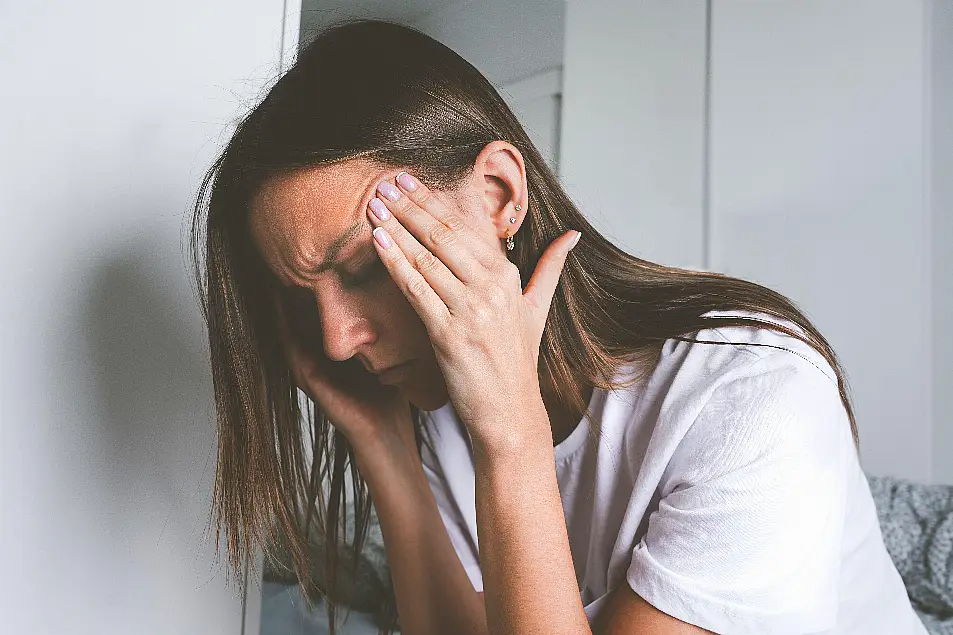While throbbing head pain is a key symptom, migraine is much more than just a headache. This long-term condition causes people to have migraine ‘attacks’ which can range from moderate to severe, sometimes meaning people completely lose their ability to function normally until it passes.
There are different types of migraine and how they affect people can vary. But in addition to headaches, Phil Day, superintendent pharmacist at Pharmacy2U, says symptoms often include “nausea and a sensitivity to light or sound”.
Day adds: “You might hear the term ‘aura’ when talking about migraines. They are temporary warning symptoms like dizziness, blind spots and flashing lights, that will alert sufferers to an impending migraine. These will affect a third of people who have migraines and can last up to an hour.”
Other people might experience other warning signs, such as suddenly feeling very tired and yawning a lot, peeing more, a stiff neck and sudden shift in mood. Pins and needles can also occur, and even difficulty speaking.
“Although the precise cause of migraines is unknown, they are widely understood to be linked to abnormalities that temporarily affect nerve signals, chemicals, and blood vessels in the brain,” says Day. “And migraines can be set off by triggers that are unique to each individual.”
This is why understanding triggers can be key in helping manage migraine. But what exactly are they, and how can you identify them?
What are migraine triggers?
“Triggers are actions or circumstances that can lead to a migraine attack,” says Steph Weatherley, senior information and support adviser at The Migraine Trust charity. “Triggers are specific to an individual and can range from some foods, to hormonal or environmental.”
Common migraine triggers include alcohol and hormone changes during the menstrual cycle or perimenopause. Lack of regularity with sleep and meals is also be a common trigger, while some people find certain forms of exercise and specific foods trigger attacks.
“Dehydration, stress and caffeine” are also fairly common triggers, notes Day, and even certain shifts in the weather can affect some migraine sufferers.
Weatherley adds: “Many people with migraine report that combinations of triggers can set off an attack, and therefore their sensitivity to a certain trigger may depend on the other triggers they’ve been exposed to at any given time. This makes identifying and managing triggers a difficult challenge for many.”
Triggers and warning signs are two different things

As mentioned, many people with migraine experience warning signs before an attack. These can often be mistaken as triggers, but they are not the same thing.
“For example, a person may feel bothered by bright lights and then move into the main attack stage and associate the bright lights as a trigger that started the attack, when it may have been that light sensitivity was a premonitory (early warning) symptom,” explains Weatherley.
Keeping a symptom diary can help
“It can be helpful for anyone living with migraine to understand their triggers to better manage the condition,” Weatherley continues. “Keeping a headache diary is a good way for people to get an idea of their personal triggers and particular patterns in their migraine attacks.”
She points out that “both individual triggers and sensitivity to triggers can change over time” too.
Managing expectations
In addition to the above though, Weatherley says: “It’s important to note that it is not always possible to avoid triggers, particularly those such as weather changes, so having realistic expectations when it comes to exposure to triggers is recommended.
“People with migraine may find that even after going to great lengths to avoid their identified triggers, they still experience a migraine attack.

“Some triggers, such as interrupted sleep, can be difficult to manage, however having a good daily routine such as a regular bed and wake-up times, regular mealtimes, keeping hydrated and regular exercise can help manage migraine and general wellbeing,” she adds.
“When combinations of triggers are identified, it can help to be aware and avoid those that it’s possible to (for example, avoiding alcohol during a time when routine change is likely to be unavoidable).”
Triggers are just part of the picture
Ensuring you have all the advice you need and suitable medication for your migraines is also important. And self-medicating with over-the-counter painkillers may actually end up making symptoms worse.
“As migraines can vary so much, it’s important to speak to a doctor. First, they can diagnose the condition, setting aside from ‘just’ a headache, before working out the best options,” says Day.
“Repeated use of painkillers can make some migraines worse, potentially leading to medication overuse headaches, a condition where frequent use of pain relief actually causes more headaches. Without medical guidance, sufferers might be unaware of this risk, and of the range of different treatments available that could be more effective and safer for long-term use.”
Weatherley says: “Both acute treatments and, for those experiencing four or more migraine attacks per month, preventive treatment options are available and may be used alongside trigger management to address migraine.”







